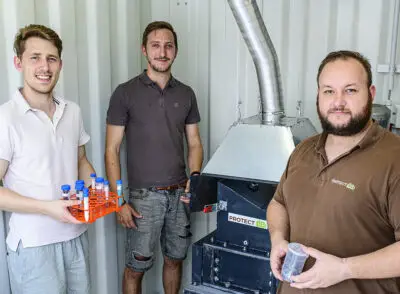A new approach to recycling electric vehicle batteries has been developed by a startup from the University of Graz. ProtectLib, founded by Jürgen Abraham, Tobias Kopp and Chris Pichler, has developed a compact system for on-site recycling of lithium-ion batteries from electric vehicles.
The recycling of electric vehicle components, especially batteries, is a challenge in the field of sustainable mobility. While many parts of electric vehicles are recyclable, batteries pose unique issues due to their energy content and potential safety hazards. The valuable raw materials in these batteries also require efficient recycling processes.
Traditional recycling methods for lithium-ion batteries have been limited to specialized facilities, requiring the transportation of used batteries. ProtectLib’s innovation addresses this by enabling recycling at the point of origin.
The company’s patented recycling process is housed in a unit the size of a standard shipping container, facilitating on-site processing of vehicle batteries. This design aims to reduce transportation costs and mitigate the risks associated with moving potentially unstable batteries.
Tobias Kopp, co-founder of ProtectLib, explains that their technology “can separate lithium, cobalt and nickel from liquid electrolytes without using heat. This process is designed to increase efficiency and reduce the hazardous nature of the residual materials, potentially reducing costs and environmental impact.
ProtectLib is currently focusing on automotive batteries, as the different chemical compositions of smaller electronic device batteries present additional complexities. The first prototype of the recycling system is operational on the campus of the University of Graz and the company has secured its first customer in the south of Graz.
This customer, a company developing battery prototypes for transportation, plans to use ProtectLib’s technology to recycle these prototypes on site. This collaboration represents a step towards sustainable battery recycling in the automotive sector and may influence future practices for handling end-of-life electric vehicle batteries.
Source: University of Graz News
















